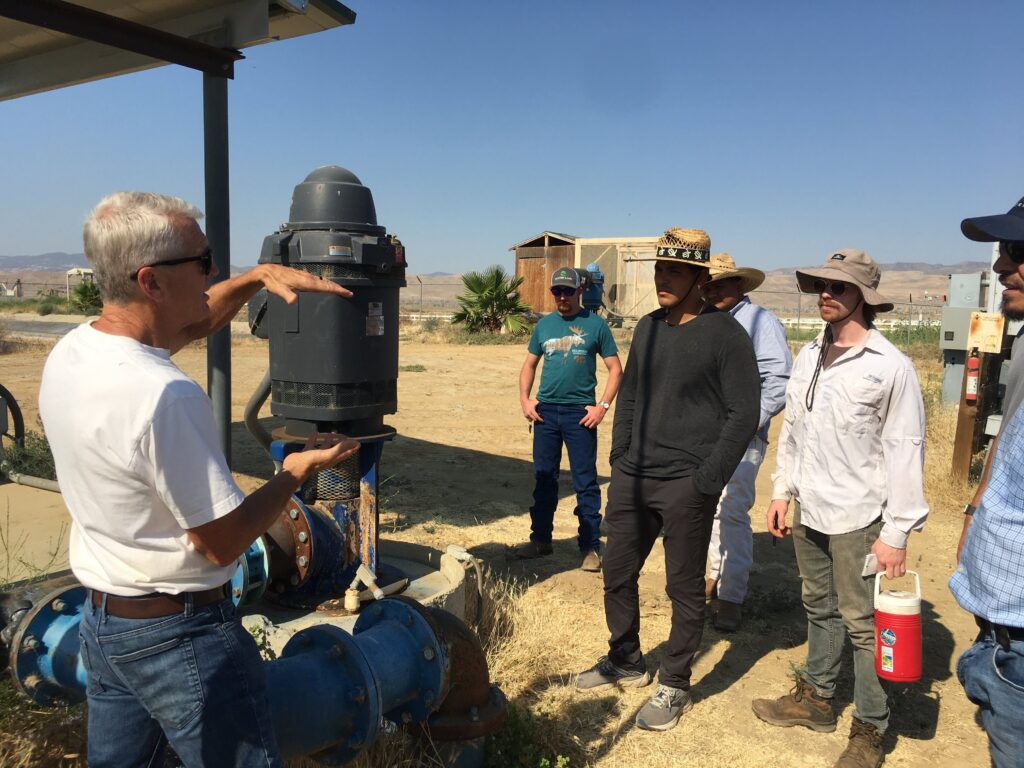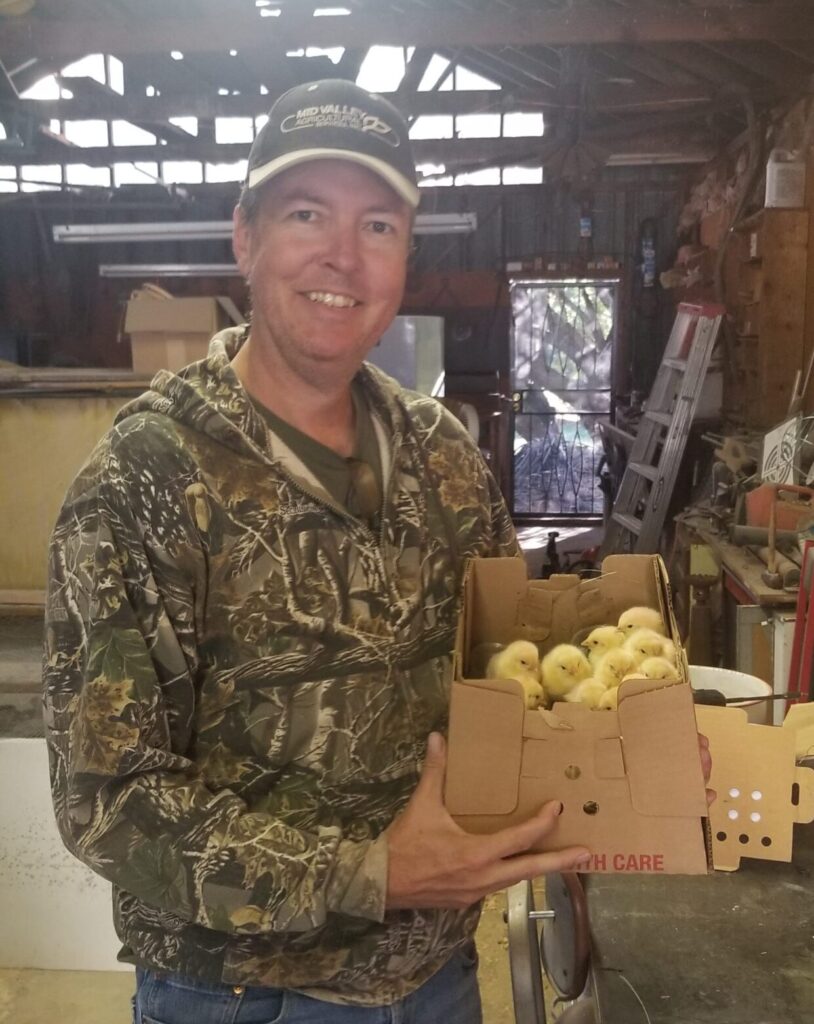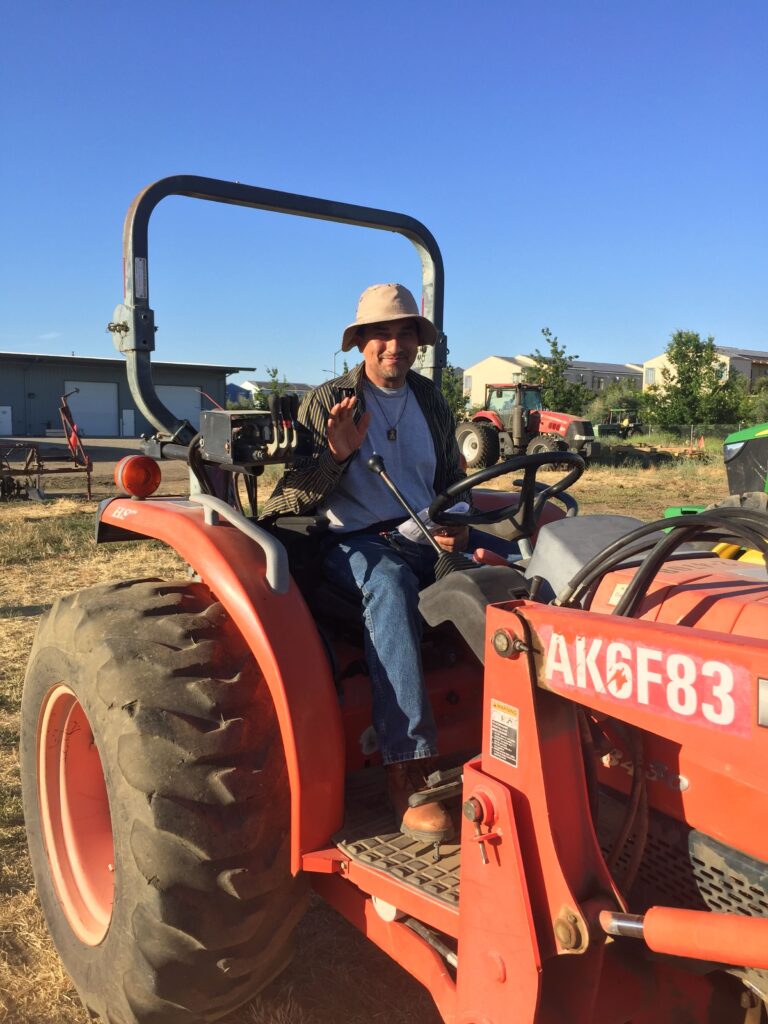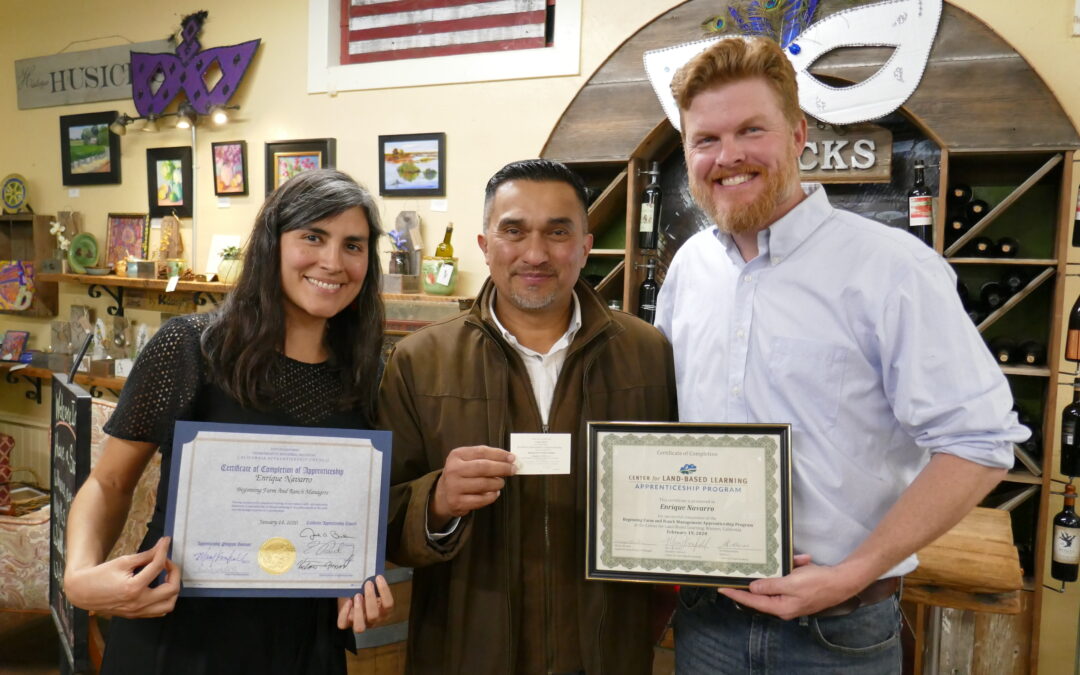MONDAY, JULY 26, 2021. BY BRI GROSSKOPF, CENTER FOR LAND-BASED LEARNING.
Skills in communication, teamwork and management are highly prized when seeking new employees. The Center for Land-Based Learning (CLBL), an agricultural education nonprofit headquartered in Woodland, CA is paving a new pathway for future farm managers to develop these skills and more through a structured registered apprenticeship. During this two-year program, current employees prepare for managerial roles while receiving hands-on training and taking courses in ag production, leadership and management. CLBL also provides employers with a pool of prescreened and qualified applicants for those looking to hire.
CLBL’s California Farm Academy Apprenticeship Program piloted its first year in 2017 and has been expanding ever since. This program is registered with the California Division of Apprenticeship Standards and provides training for a career in farm management, with more pathways to come. With a structured hands-on component, apprentices become well-versed in occupational skills such as irrigation management, sales and marketing, and equipment repair. While working on the farm, apprentices also complete virtual coursework in ag production through a partnership with West Hills College. All coursework is paid for by CLBL and curriculum partnerships. Most recently, apprentices have started participating in monthly cohort calls to engage in peer-to-peer learning while completing modules designed to foster skills in leadership, communication, team effectiveness, and more.

Apprentices participating in an in-person lab for their Irrigation Course at West Hills College in Coalinga, July 2021.
By providing education through an online platform, apprentices are able to work on farms statewide. Participating farms range in industries from vegetables and orchards to vineyards and cut flowers and are located primarily across the Central Valley. CLBL is working to connect with more farmers around the state. Employers need to be able to provide at least 3,000 hours of paid work over the course of two years while offering experience in different areas such as plant care, harvesting and grading products, pest and weed management, and driving a tractor. Applicants generally come to the program with some previous agricultural experience or relevant skills to be successful on a farming operation.
Stewart Lyons is a newly enrolled Apprentice and is training at his family’s farm in Plymouth, CA. After spending 20 years as a Corrections Counselor with the Federal Bureau of Prisons, Stewart retired to LODI RULES certified sustainable Deaver Vineyards to help run the family farm as his parents age. Hoping to learn new farming practices to contribute in the vineyards, he joined the Apprenticeship program to expand his knowledge in ag production. Stewart brings many transferable skills such as communication, time management and managerial experience to this role and is getting used to his new lifestyle of living on the farm. After years of working inside of a prison, he is looking forward to being outside in the fields and working with his hands. And while it’s been a transition from 20 years at a 9-5 day job, Stewart shared, “I’ve always had a passion for agriculture and livestock, and I’m learning something new every day.”

Stewart Lyons with his newly introduced chicks at Deaver Vineyards, June 2021.
Stewart is currently taking a welding class and has many projects lined up. He is also looking forward to a soil science course starting in the spring semester of 2022. For apprentices who need a foundation in ag production, CLBL provides introductory courses in soil science, ag irrigation management, plant science, and integrated pest management. Those who come to the program with previous academic experience in agriculture can receive credit for these courses and take more advanced coursework applicable to their career goals. All apprentices participate in management and leadership training together in monthly cohort meetings. In the few months that Stewart has been enrolled he has found these to be very valuable, sharing, “the cohort calls are really exciting. I’m looking forward to opportunities to become a better agricultural leader and community member.”
In addition to providing development opportunities for individual employees, registered apprenticeship offers employers the opportunity to invest in their entire team while supporting our industry. Fellow LODI RULES farmer David Ogilvie of Wilson Vineyards and mentor of Apprenticeship Program graduate Enrique Navarro shares, “Having a pathway to get people who are already within agriculture into a management role and to understand different ways to do things that they don’t necessarily need to go to college for, really helps the industry. We can have that pipeline to get people, young and middle aged, into other positions.” David suggested the Apprenticeship Program to Enrique after seeing his outstanding leadership potential as a regular employee of Wilson Vineyards. Now one year after graduation, Enrique is in line to be the new Labor Manager and is doing things like upgrading the system for tracking hours to a more modern one. [Featured Image: Apprenticeship Program Manager Marisa Alcorta, Enrique Navarro, and David Wilson of Wilson Vineyards at Enrique’s graduation, February 2020.]
Finding farmers like David, who have current employees with potential for management, is one of the many ways CLBL is looking to support farmers through this Apprenticeship. As more and more farmers reach out in hopes of filling the shoes of their retiring managers, staff start by asking if there are current team members that could move up with additional training. And for those employers looking to hire? Stewart and Enrique are just some of the many individuals ready to step into leadership roles in the ag industry. In the last year, the program has seen a significant increase in applications. Forming connections between qualified applicants and hiring farmers is a priority of the Apprenticeship team and they hope to facilitate and foster more of these apprentice-employer relationships to help strengthen labor in the ag industry over time.

Enrique Navarro participating in a Beginning Farmer Training tractor class at the Western Center for Agricultural Equipment on the University of California – Davis campus. June 2018.
Employers and aspiring farmers alike can learn how to get involved in growing the pipeline of skilled farm managers by visiting landbasedlearning.org/farm-academy-apprentice.
Have something interesting to say? Consider writing a guest blog article!
To subscribe to the Coffee Shop Blog, send an email to stephanie@lodiwine.com with the subject “blog subscribe.”
To join the Lodi Growers email list, send an email to stephanie@lodiwine.com with the subject “grower email subscribe.”
To receive Lodi Grower news and event promotions by mail, send your contact information to stephanie@lodiwine.com or call 209.367.4727.
For more information on the wines of Lodi, visit the Lodi Winegrape Commission’s consumer website, lodiwine.com.
For more information on the LODI RULES Sustainable Winegrowing Program, visit lodigrowers.com/standards or lodirules.org.


